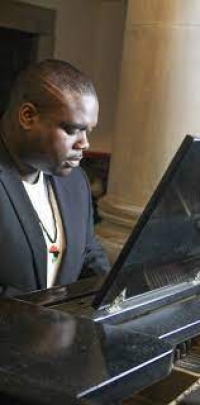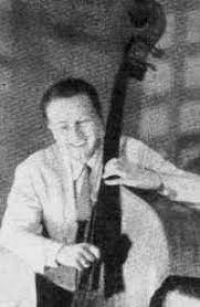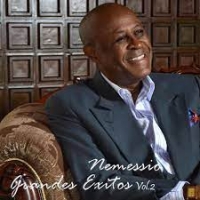Latest Sheet Music
Paganini

Niccolò Paganini (27 October 1782 – 27 May 1840) was an Italian violinist, violist, guitarist, and composer. He was one of the most celebrated violin virtuosi of his time, and left his mark as one of the pillars of modern violin technique. His caprice in A minor, Op. 1 No. 24 is among his best known of compositions, and serves as inspiration for many prominent artists.
Paganini composed his own works to play exclusively in his concerts, all of which had profound influences on the evolution of violin techniques. His 24 Caprices were probably composed in the period between 1805 to 1809, while he was in the service of the Baciocchi court. Also during this period, he composed the majority of the solo pieces, duo-sonatas,trios and quartets for the guitar. These chamber works may have been inspired by the publication, in Lucca, of the guitar quintets of Boccherini. Many of his variations (and he has become the de facto master of this musical genre), including Le Streghe, The Carnival of Venice, and Nel cor più non mi sento, were composed, or at least first performed, before his European concert tour.
Playbill of Paganini's concert at the Covent Garden in 1832. Note that all solo pieces were of his composition, which was typical of all his concerts.
Generally speaking, Paganini's compositions were technically imaginative, and the timbre of the instrument was greatly expanded as a result of these works. Sounds of different musical instruments and animals were often imitated. One such composition was titled Il Fandango Spanolo (The Spanish Dance), which featured a series of humorous imitations of farm animals. Even more outrageous was a solo piece Duetto Amoroso, in which the sighs and groans of lovers were intimately depicted on the violin. Fortunately there survives a manuscript of the Duetto which has been recorded, while the existence of the Fandango is known only through concert posters.
However, his works were criticized for lacking characteristics of true polyphonism, as pointed out by Eugène Ysaÿe. Yehudi Menuhin, on the other hand, suggested that this might have been the result of his reliance on the guitar (in lieu of the piano) as an aid in composition. The orchestral parts for his concertos were often polite, unadventurous, and clearly supportive of the soloist. In this, his style is consistent with that of other Italian composers such as Paisiello, Rossini and Donizetti, who were influenced by the guitar-song milieu of Naples during this period.
Paganini was also the inspiration of many prominent composers. Both "La Campanella" and the A minor caprice (Nr. 24) have been an object of interest for a number of composers. Franz Liszt, Johannes Brahms, Sergei Rachmaninoff, Boris Blacher, Andrew Lloyd Webber, George Rochberg and Witold Lutosławski, among others, wrote well-known variations on these themes.
Paganini composed his own works to play exclusively in his concerts, all of which had profound influences on the evolution of violin techniques. His 24 Caprices were probably composed in the period between 1805 to 1809, while he was in the service of the Baciocchi court. Also during this period, he composed the majority of the solo pieces, duo-sonatas,trios and quartets for the guitar. These chamber works may have been inspired by the publication, in Lucca, of the guitar quintets of Boccherini. Many of his variations (and he has become the de facto master of this musical genre), including Le Streghe, The Carnival of Venice, and Nel cor più non mi sento, were composed, or at least first performed, before his European concert tour.
Playbill of Paganini's concert at the Covent Garden in 1832. Note that all solo pieces were of his composition, which was typical of all his concerts.
Generally speaking, Paganini's compositions were technically imaginative, and the timbre of the instrument was greatly expanded as a result of these works. Sounds of different musical instruments and animals were often imitated. One such composition was titled Il Fandango Spanolo (The Spanish Dance), which featured a series of humorous imitations of farm animals. Even more outrageous was a solo piece Duetto Amoroso, in which the sighs and groans of lovers were intimately depicted on the violin. Fortunately there survives a manuscript of the Duetto which has been recorded, while the existence of the Fandango is known only through concert posters.
However, his works were criticized for lacking characteristics of true polyphonism, as pointed out by Eugène Ysaÿe. Yehudi Menuhin, on the other hand, suggested that this might have been the result of his reliance on the guitar (in lieu of the piano) as an aid in composition. The orchestral parts for his concertos were often polite, unadventurous, and clearly supportive of the soloist. In this, his style is consistent with that of other Italian composers such as Paisiello, Rossini and Donizetti, who were influenced by the guitar-song milieu of Naples during this period.
Paganini was also the inspiration of many prominent composers. Both "La Campanella" and the A minor caprice (Nr. 24) have been an object of interest for a number of composers. Franz Liszt, Johannes Brahms, Sergei Rachmaninoff, Boris Blacher, Andrew Lloyd Webber, George Rochberg and Witold Lutosławski, among others, wrote well-known variations on these themes.
Alexandre Danilevski
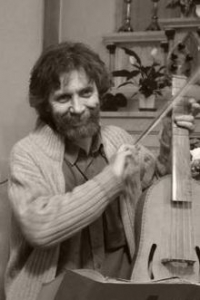
Alexandre Danilevski (Russian: Александр Данилевский; born in 1957 in Saint Petersburg) is a Russian-born French composer, lutenist, vielle player, active in Metz, France. He is the artistic director of Syntagma, an early music ensemble noted in particular for interpretations of music by the trouvères, Italian composers from Trecento, and Russian and Ukrainian baroque composers.
Benjamin Britten
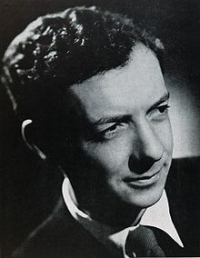
Edward Benjamin Britten, Baron Britten of Aldeburgh, OM CH (22 November 1913 – 4 December 1976) was an English composer, conductor, and pianist. Showing prodigious talent from an early age – he composed his Quatre Chansons françaises for soprano and orchestra at the age of fourteen – he first came to public attention with the a cappella choral work A Boy Was Born. With the premiere of his opera Peter Grimes in 1945 he leapt to international fame, and for the next fifteen years he devoted much of his compositional attention to writing operas, several of which now appear regularly on international stages. Britten's interests as a composer were wide-ranging; he produced important music in such varied genres as orchestral, choral, solo vocal (much of it written for the tenor Peter Pears), chamber and instrumental, as well as film music. He also took a great interest in writing music for children and amateur performers, and was considered a fine pianist and conductor.
pat metheny

Patrick Bruce "Pat" Metheny (/məˈθiːni/ mə-thee-nee; born August 12, 1954) is an American jazz guitarist and composer.
He is the leader of the Pat Metheny Group and is also involved in duets, solo works and other side projects. His style incorporates elements of progressive and contemporary jazz, post-bop, latin jazz and jazz fusion. Pat Metheny has three gold albums and 20 Grammy Awards. He is the brother of jazz flugelhornist and journalist Mike Metheny.
He is the leader of the Pat Metheny Group and is also involved in duets, solo works and other side projects. His style incorporates elements of progressive and contemporary jazz, post-bop, latin jazz and jazz fusion. Pat Metheny has three gold albums and 20 Grammy Awards. He is the brother of jazz flugelhornist and journalist Mike Metheny.
fritz kauffmann
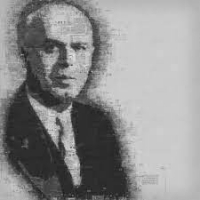
Kaufmann is a surname with many variants such as Kauffmann, Kaufman, and Kauffman. In German, the name means merchant. It is the cognate of the English Chapman (which had a similar meaning in the Middle Ages, though it disappeared from modern English). Kaufmann may refer to:
Morton Feldman
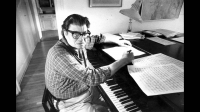
Morton Feldman was an American composer. A major figure in 20th-century classical music, Feldman was a pioneer of indeterminate music, a development associated with the experimental New York School of composers also including John Cage, Christian Wolff, and Earle Brown.
Bobby Capo
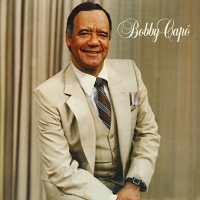
Félix Manuel "Bobby" Rodríguez Capó (January 1, 1922 – December 18, 1989) was a Puerto Rican singer and songwriter. He usually combined ballads with classical music and was deeply involved in Puerto Rican folk elements and even Andalusian music, as to produce many memorable Latino pop songs which featured elaborate, dramatic lyrics.
COLORADO COOK BOOK
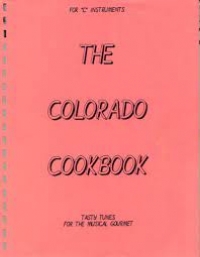
FOR "C" INSTRUMENTS. THE. COLORADO. COOKBOOK. TASTY TUNES. FOR THE MUSICAL GOURMET
Music theory

Music theory is the study of the practices and possibilities of music. The Oxford Companion to Music describes three interrelated uses of the term "music theory"
Johann Sebastian Bach

Johann Sebastian Bach (31 March 1685 – 28 July 1750) was a German composer and musician of the Baroque period. He is known for instrumental compositions such as the Art of Fugue, the Brandenburg Concertos, and the Goldberg Variations, and for vocal music such as the St Matthew Passion and the Mass in B minor. Since the 19th-century Bach Revival he has been generally regarded as one of the greatest composers of the Western art musical canon.
Ennio Morricone
Ennio Morricone, OMRI (born November 10, 1928), is an Italian composer and conductor. He has composed and arranged scores for more than 500 film and television productions. Morricone is considered as one of the most influential film composers since the late 1950s. He is well-known for his long-term collaborations with international acclaimed directors such as Sergio Leone, Brian De Palma, Barry Levinson, and Giuseppe Tornatore.
He wrote the characteristic film scores of Leone's Spaghetti Westerns A Fistful of Dollars (1964), For a Few Dollars More (1965), The Good, the Bad and the Ugly (1966), Once Upon a Time in the West (1968), The Great Silence (1968), and My Name Is Nobody (1973). In the 80s, Morricone composed the scores for John Carpenter's horror movie The Thing (1982), Leone's Once Upon a Time in America (1984), Roland Joffé's The Mission (1986), Brian De Palma's The Untouchables (1987) and Giuseppe Tornatore's Cinema Paradiso (1988).
His more recent compositions include the scores for Oliver Stone's U Turn (1997), Tornatore's The Legend of 1900 (1998) and Malèna (2000), Mission to Mars (2000) by Brian De Palma, Fateless (2005), and Baaria - La porta del vento (2009). Ennio Morricone has won two Grammy Awards, two Golden Globes and five Anthony Asquith Awards for Film Music by BAFTA in 1979–1992. He has been nominated for five Academy Awards for Best Music, Original Score in 1979–2001. Morricone received the Honorary Academy Award in 2007 "for his magnificent and multifaceted contributions to the art of film music". He was the second composer to receive this award after its introduction in 1928.
He wrote the characteristic film scores of Leone's Spaghetti Westerns A Fistful of Dollars (1964), For a Few Dollars More (1965), The Good, the Bad and the Ugly (1966), Once Upon a Time in the West (1968), The Great Silence (1968), and My Name Is Nobody (1973). In the 80s, Morricone composed the scores for John Carpenter's horror movie The Thing (1982), Leone's Once Upon a Time in America (1984), Roland Joffé's The Mission (1986), Brian De Palma's The Untouchables (1987) and Giuseppe Tornatore's Cinema Paradiso (1988).
His more recent compositions include the scores for Oliver Stone's U Turn (1997), Tornatore's The Legend of 1900 (1998) and Malèna (2000), Mission to Mars (2000) by Brian De Palma, Fateless (2005), and Baaria - La porta del vento (2009). Ennio Morricone has won two Grammy Awards, two Golden Globes and five Anthony Asquith Awards for Film Music by BAFTA in 1979–1992. He has been nominated for five Academy Awards for Best Music, Original Score in 1979–2001. Morricone received the Honorary Academy Award in 2007 "for his magnificent and multifaceted contributions to the art of film music". He was the second composer to receive this award after its introduction in 1928.
Robert Johnson
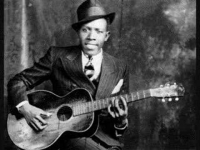
Robert Leroy Johnson was an American blues singer-songwriter and musician. His landmark recordings in 1936 and 1937 display a combination of singing, guitar skills, and songwriting talent that has influenced later generations of musicians.
Zoltan Paulinyi

Zoltán Paulínyi Körmendy (Pittsfield, MA, 1977) conhecido pelo nome artístico de Zoltan Paulini, é um violinista, violista (barroco e moderno) e compositor americano-brasileiro. É profissionalmente ativo desde 1995, e utiliza principalmente instrumentos fabricados e restaurados pelo luthier Carlos Martins del Picchia.
The Masada String Trio
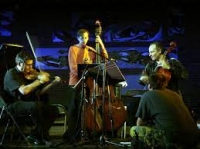
The Masada String Trio consists of Mark Feldman (violin), Erik Friedlander (cello), and Greg Cohen (bass). Zorn sits in and conducts them.
Isaac Albeniz

Isaac Albéniz i Pascual (Spanish pronunciation: ) (May 29, 1860 – May 18, 1909) was a Spanish pianist and composer best known for his piano works based on folk music.
Albéniz’ Suite Española Op.47 is comprised mainly of pieces written in 1886, and grouped together in 1887 in honor of the Queen of Spain. Like many of Albéniz' piano pieces, these works are miniature tone pictures of different geographical regions and musical idioms of Spain. The eight original titles are Granada, Cataluna, Sevilla, Cadiz, Asturias, Aragon, Castilla and Cuba but only the first three titles and Cuba appeared in the original collection. The other pieces were published in later collections, often with different titles. The publisher Hofmeister published all eight titles of Suite Espanola in 1911 after Albéniz’ death, appropriating other pieces for the other four titles so those pieces do not always accurately reflect the geographic designation of the titles, most obviously in the case of Asturias (Leyenda) whose Andalusian flamenco rhythms bear little resemblance to the music of the northern province Asturias. The opus number 47 assigned by Hofmeister has no relation to any chronological order in Albéniz’ oeuvre, in which opus numbers were randomly given by publishers or by Albéniz himself, with some pieces appearing in more than one collection.
Albéniz’ Suite Española Op.47 is comprised mainly of pieces written in 1886, and grouped together in 1887 in honor of the Queen of Spain. Like many of Albéniz' piano pieces, these works are miniature tone pictures of different geographical regions and musical idioms of Spain. The eight original titles are Granada, Cataluna, Sevilla, Cadiz, Asturias, Aragon, Castilla and Cuba but only the first three titles and Cuba appeared in the original collection. The other pieces were published in later collections, often with different titles. The publisher Hofmeister published all eight titles of Suite Espanola in 1911 after Albéniz’ death, appropriating other pieces for the other four titles so those pieces do not always accurately reflect the geographic designation of the titles, most obviously in the case of Asturias (Leyenda) whose Andalusian flamenco rhythms bear little resemblance to the music of the northern province Asturias. The opus number 47 assigned by Hofmeister has no relation to any chronological order in Albéniz’ oeuvre, in which opus numbers were randomly given by publishers or by Albéniz himself, with some pieces appearing in more than one collection.
Nick Hexum
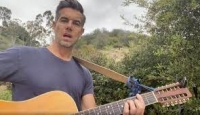
Nicholas Lofton Hexum is an American singer, songwriter and rapper, currently the vocalist and guitarist for the multi-platinum alternative rock band 311 and The Nick Hexum Quintet.
Bach

Johann Sebastian Bach (31 March 1685 – 28 July 1750) was a German composer and organist whose sacred and secular works for choir, orchestra, and solo instruments drew together the strands of the Baroque period and brought it to its ultimate maturity. Although he introduced no new forms, he enriched the prevailing German style with a robust contrapuntal technique, an unrivalled control of harmonic and motivic organisation in composition for diverse musical forces, and the adaptation of rhythms and textures from abroad, particularly Italy and France.
Revered for their intellectual depth and technical and artistic beauty, Bach's works include the Brandenburg concertos; the Goldberg Variations; the English Suites, French Suites, Partitas, and Well-Tempered Clavier; the Mass in B Minor; the St. Matthew Passion; the St. John Passion; The Musical Offering; The Art of Fugue; the Sonatas and Partitas for violin solo; the Cello Suites; more than 200 surviving cantatas; and a similar number of organ works, including the celebrated Toccata and Fugue in D Minor.
While Bach's fame as an organist was great during his lifetime, he was not particularly well-known as a composer. His adherence to Baroque forms and contrapuntal style was considered "old-fashioned" by his contemporaries, especially late in his career when the musical fashion tended towards Rococo and later Classical styles. A revival of interest and performances of his music began early in the 19th century, and he is now widely considered to be one of the greatest composers in the Western tradition.
Revered for their intellectual depth and technical and artistic beauty, Bach's works include the Brandenburg concertos; the Goldberg Variations; the English Suites, French Suites, Partitas, and Well-Tempered Clavier; the Mass in B Minor; the St. Matthew Passion; the St. John Passion; The Musical Offering; The Art of Fugue; the Sonatas and Partitas for violin solo; the Cello Suites; more than 200 surviving cantatas; and a similar number of organ works, including the celebrated Toccata and Fugue in D Minor.
While Bach's fame as an organist was great during his lifetime, he was not particularly well-known as a composer. His adherence to Baroque forms and contrapuntal style was considered "old-fashioned" by his contemporaries, especially late in his career when the musical fashion tended towards Rococo and later Classical styles. A revival of interest and performances of his music began early in the 19th century, and he is now widely considered to be one of the greatest composers in the Western tradition.
Ludwig van Beethoven

Ludwig van Beethoven (/ˈlʊdvɪɡ væn ˈbeɪt(h)oʊvən/ (About this soundlisten); German: (About this soundlisten); baptised 17 December 1770 – 26 March 1827) was a German composer and pianist. A crucial figure in the transition between the classical and romantic eras in classical music, he remains one of the most recognized and influential musicians of this period, and is considered to be one of the greatest composers of all time.
Beethoven was born in Bonn, the capital of the Electorate of Cologne, and part of the Holy Roman Empire. He displayed his musical talents at an early age and was vigorously taught by his father Johann van Beethoven, and was later taught by composer and conductor Christian Gottlob Neefe. At age 21, he moved to Vienna and studied composition with Joseph Haydn. Beethoven then gained a reputation as a virtuoso pianist, and was soon courted by Prince Lichnowsky for compositions, which resulted in Opus 1 in 1795.
Beethoven was born in Bonn, the capital of the Electorate of Cologne, and part of the Holy Roman Empire. He displayed his musical talents at an early age and was vigorously taught by his father Johann van Beethoven, and was later taught by composer and conductor Christian Gottlob Neefe. At age 21, he moved to Vienna and studied composition with Joseph Haydn. Beethoven then gained a reputation as a virtuoso pianist, and was soon courted by Prince Lichnowsky for compositions, which resulted in Opus 1 in 1795.
Sperion

Sperion Musician/band. Anime / Game / J-Drama / Japanese popular music and soundtrack transcriber / arranger.
John Patitucci
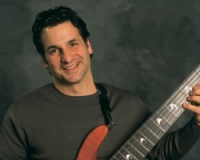
John Patitucci (born December 22, 1959) is an American jazz double bass and jazz fusion electric bass player.
Chopin

Frédéric Chopin (1 March 1810 – 17 October 1849) was a Polish composer and virtuoso pianist of the Romantic period. He is widely regarded as the greatest Polish composer, and ranks as one of music's greatest tone poets.
He was born in the village of Żelazowa Wola, in the Duchy of Warsaw, to a Polish mother and French-expatriate father, and in his early life was regarded as a child-prodigy pianist. In November 1830, at the age of 20, Chopin went abroad; following the suppression of the Polish November Uprising of 1830–31, he became one of many expatriates of the Polish "Great Emigration."
In Paris, he made a comfortable living as a composer and piano teacher, while giving few public performances. A Polish patriot,
Chopin's extant compositions were written primarily for the piano as a solo instrument. Though technically demanding, Chopin's style emphasizes nuance and expressive depth rather than virtuosity. Chopin invented musical forms such as the ballade and was responsible for major innovations in forms such as the piano sonata, waltz, nocturne, étude, impromptu and prelude. His works are mainstays of Romanticism in 19th-century classical music.
He was born in the village of Żelazowa Wola, in the Duchy of Warsaw, to a Polish mother and French-expatriate father, and in his early life was regarded as a child-prodigy pianist. In November 1830, at the age of 20, Chopin went abroad; following the suppression of the Polish November Uprising of 1830–31, he became one of many expatriates of the Polish "Great Emigration."
In Paris, he made a comfortable living as a composer and piano teacher, while giving few public performances. A Polish patriot,
Chopin's extant compositions were written primarily for the piano as a solo instrument. Though technically demanding, Chopin's style emphasizes nuance and expressive depth rather than virtuosity. Chopin invented musical forms such as the ballade and was responsible for major innovations in forms such as the piano sonata, waltz, nocturne, étude, impromptu and prelude. His works are mainstays of Romanticism in 19th-century classical music.
Johan Agrell
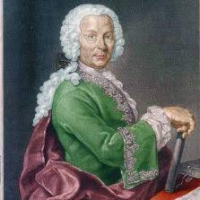
Johan Joachim Agrell (1 February 1701 – 19 January 1765) was a late German/Swedish baroque composer.He was born in Löth parish, Memming district, Östergötland, a province in Sweden, and studied in Uppsala. By 1734 he was a violinist at the Kassel court, travelling in England, France, Italy, and elsewhere. From 1746 onward, he was Kapellmeister in Nuremberg.
Teresa Tang

Teng Li-Chun, commonly known as Teresa Teng, was a Taiwanese singer, actress, musician and philanthropist. Dubbed as "Asia's eternal queen of pop", Teng became a cultural icon for her contributions to Mandopop, giving birth to the phrase, "Wherever there are Chinese people, there is the music of Teresa Teng".
Frankie hi-nrg mc
Francesco Di Gesù, better known by his stage name Frankie Hi-NRG MC, is an Italian rapper. He has been active since the early stages of the Italian hip hop movement in the early 1990s and is regarded as one of the pioneers of the genre.
Incansables
Incansables Musical artist La Pilindros Euskal Herria Festetan! - Fanfarrias, Orqestinas Y Comparsas Callejeras · 2008
Poupurri 1 Euskal Herria Festetan! - Fanfarrias, Orqestinas Y Comparsas Callejeras · 2008 Jota Eta Arin Arin Euskal Herria Festetan! - Fanfarrias, Orqestin.
Poupurri 1 Euskal Herria Festetan! - Fanfarrias, Orqestinas Y Comparsas Callejeras · 2008 Jota Eta Arin Arin Euskal Herria Festetan! - Fanfarrias, Orqestin.
Johannes Brahms
Johannes Brahms (May 7, 1833 â April 3, 1897) was a German composer of the Romantic period. He was born in Hamburg and in his later years he settled in Vienna, Austria.
Brahms maintained a Classical sense of form and order in his works â in contrast to the opulence of the music of many of his contemporaries. Thus many admirers (though not necessarily Brahms himself) saw him as the champion of traditional forms and "pure music," as opposed to the New German embrace of program music.
Brahms venerated Beethoven: in the composer's home, a marble bust of Beethoven looked down on the spot where he composed, and some passages in his works are reminiscent of Beethoven's style. The main theme of the finale of Brahms's First Symphony is reminiscent of the main theme of the finale of Beethoven's Ninth, and when this resemblance was pointed out to Brahms he replied that any ass â jeder Esel â could see that.
Ein deutsches Requiem was partially inspired by his mother's death in 1865, but also incorporates material from a Symphony he started in 1854, but abandoned following Schumann's suicide attempt. He once wrote that the Requiem "belonged to Schumann". The first movement of this abandoned Symphony was re-worked as the first movement of the First Piano Concerto.
Brahms also loved the Classical composers Mozart and Haydn. He collected first editions and autographs of their works, and edited performing editions. He also studied the music of pre-classical composers, including Giovanni Gabrieli, Johann Adolph Hasse, Heinrich Schütz and especially Johann Sebastian Bach. His friends included leading musicologists, and with Friedrich Chrysander he edited an edition of the works of François Couperin. He looked to older music for inspiration in the arts of strict counterpoint; the themes of some of his works are modelled on Baroque sources, such as Bach's The Art of Fugue in the fugal finale of Cello Sonata No. 1, or the same composer's Cantata No. 150 in the passacaglia theme of the Fourth Symphony's finale.
Brahms maintained a Classical sense of form and order in his works â in contrast to the opulence of the music of many of his contemporaries. Thus many admirers (though not necessarily Brahms himself) saw him as the champion of traditional forms and "pure music," as opposed to the New German embrace of program music.
Brahms venerated Beethoven: in the composer's home, a marble bust of Beethoven looked down on the spot where he composed, and some passages in his works are reminiscent of Beethoven's style. The main theme of the finale of Brahms's First Symphony is reminiscent of the main theme of the finale of Beethoven's Ninth, and when this resemblance was pointed out to Brahms he replied that any ass â jeder Esel â could see that.
Ein deutsches Requiem was partially inspired by his mother's death in 1865, but also incorporates material from a Symphony he started in 1854, but abandoned following Schumann's suicide attempt. He once wrote that the Requiem "belonged to Schumann". The first movement of this abandoned Symphony was re-worked as the first movement of the First Piano Concerto.
Brahms also loved the Classical composers Mozart and Haydn. He collected first editions and autographs of their works, and edited performing editions. He also studied the music of pre-classical composers, including Giovanni Gabrieli, Johann Adolph Hasse, Heinrich Schütz and especially Johann Sebastian Bach. His friends included leading musicologists, and with Friedrich Chrysander he edited an edition of the works of François Couperin. He looked to older music for inspiration in the arts of strict counterpoint; the themes of some of his works are modelled on Baroque sources, such as Bach's The Art of Fugue in the fugal finale of Cello Sonata No. 1, or the same composer's Cantata No. 150 in the passacaglia theme of the Fourth Symphony's finale.
Robert Lowry
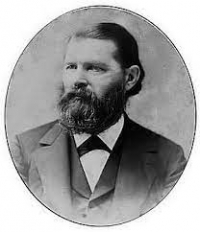
Robert Lowry (March 12, 1826 – 25 November 1899) was an American preacher who became a popular writer of gospel music in the mid- to late-19th century. His best-known hymns include "Shall We Gather at the River", "Christ Arose!", "How Can I Keep from Singing?" and "Nothing But The Blood Of Jesus".
Honk
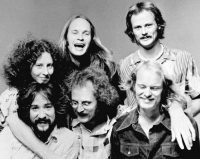
Honk is an American rock band, based in Laguna Beach, California. It's best known for providing the soundtrack for the surf documentary film, Five Summer Stories.
Carmelo Pace
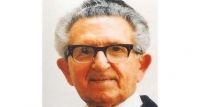
Maestro Chev. Carmelo Pace was a Maltese composer, and a professor of music theory and harmony. Born in Valletta, Malta on August 17, 1906, Pace was the eldest of three children. His parents were Anthony Pace and Maria Carmela née Ciappara.
Ryan Fraley
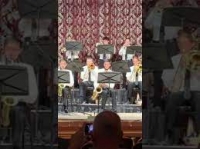
Ryan Fraley (b. 1973) is an accomplished composer, arranger, producer, music engraver, and engineer. Ryan's compositions and arrangements have been performed worldwide by jazz ensembles, orchestras, and bands of all levels. His work is published by The FJH Music Company inc.
Traditional

Cream

Cream were a British rock band formed in London in 1966. The group consisted of bassist Jack Bruce, guitarist Eric Clapton, and drummer Ginger Baker. Bruce was the primary songwriter and vocalist, although Clapton and Baker contributed to songs.
Tomaso Albinoni
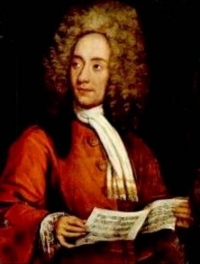
Tomaso Giovanni Albinoni (8 June 1671 – 17 January 1751) was an Italian Baroque composer. While famous in his day as an opera composer, he is known today for his instrumental music, especially his concertos. He is also remembered today for a work called "Adagio in G minor", supposedly written by him, but probably written by Remo Giazotto, a modern musicologist and composer, who was a cataloger of the works of Albinoni.
Carl Bohm
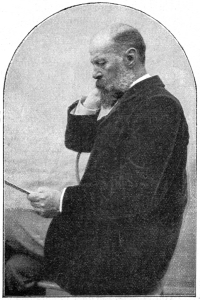
Carl Bohm (also known as Henry Cooper and Karl Bohm) (11 September 1844 – 4 April 1920) was a German pianist and composer.Bohm is regarded as one of the leading German songwriters of the 19th century, and wrote such works as Still as the Night, Twilight, May Bells, Enfant Cheri and The Fountain.The Oxford Companion to Music says that Bohm was "a German composer of great fecundity and the highest salability... He occupied an important position in the musical commonwealth inasmuch as his publisher, N. Simrock, declared that the profits on his compositions provided the capital for the publication of those of Brahms.
Gaetano Braga
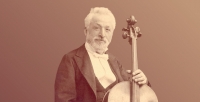
Gaetano Braga (June 9, 1829 – November 21, 1907) was an Italian composer and cellist.He was born in Giulianova in Abruzzi and died in Milan.Portrait of Gaetano Braga by Andrea Baronchelli
Braga's works include compositions for the cello (two concertos, a quintet, a quartet, works for cello and piano) and the operas.A "Serenata" (serenade) by Braga, sometimes called "Angel's Serenade" or "Légende valaque" (Wallachian Legend), is a dialogue (comparable to that in "Erlkönig") between a worried mother and a girl who hears an angel's voice calling her; in the end the girl follows the voice ("O mamma buona notte, io seguo il suon, io seguo il suon!"). It is mentioned in Anton Chekhov's short story "The Black Monk," as well as in other Russian works of the late 19th and early 20th centuries.[1
Braga's works include compositions for the cello (two concertos, a quintet, a quartet, works for cello and piano) and the operas.A "Serenata" (serenade) by Braga, sometimes called "Angel's Serenade" or "Légende valaque" (Wallachian Legend), is a dialogue (comparable to that in "Erlkönig") between a worried mother and a girl who hears an angel's voice calling her; in the end the girl follows the voice ("O mamma buona notte, io seguo il suon, io seguo il suon!"). It is mentioned in Anton Chekhov's short story "The Black Monk," as well as in other Russian works of the late 19th and early 20th centuries.[1
Nena (band)

Nena was a West German Neue Deutsche Welle band. In 1983 and 1984, their German-language song "99 Luftballons" reached number one in the singles charts of countries around the world.
Antonio Carlos Jobim

Antonio Carlos Brasileiro de Almeida Jobim (January 25, 1927 in Rio de Janeiro – December 8, 1994 in New York City), also known as Tom Jobim, was a Grammy Award-winning Brazilian songwriter, composer, arranger, singer, and pianist/guitarist. A primary force behind the creation of the bossa nova style, Jobim is acknowledged as one of the most influential popular composers of the 20th century. His songs have been performed by many singers and instrumentalists within Brazil and internationally.
Lili Boulanger
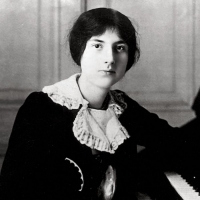
Marie-Juliette Olga "Lili" Boulanger was a French composer, and the first female winner of the Prix de Rome composition prize. Her older sister was the noted composer and composition teacher Nadia Boulanger.
Jasmine Choi

Jasmine Choi (born in Seoul, South Korea) is a Korean-born flutist, educated in the US, living in Austria.Raised in Daejeon, Choi studied at the Curtis Institute of Music and the Juilliard School, where her teachers included Julius Baker and Jeffrey Khaner, from 2000 to 2004. As a student in 2002, she was the senior division winner of the Albert M. Greenfield Student Competition, sponsored by the Philadelphia Orchestra. In 2006, Symphony Magazine included her as one of two flautists in their list of emerging artists.[4
Matt Marvuglio
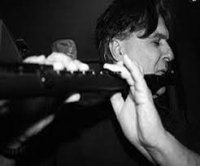
Matt Marvuglio (1945-2017) was Dean of the Performance Division at Berklee College. As a virtuosic flutist and composer, he traveled throughout the United ..
Naruto

Naruto is an ongoing Japanese manga series written and illustrated by Masashi Kishimoto with an anime adaptation. The plot tells the story of Naruto Uzumaki, a loud, hyperactive, unpredictable, adolescent ninja who constantly searches for recognition and aspires to become a Hokage, the ninja in his village that is acknowledged as the leader and the strongest of all. The series is based on a one-shot that Kishimoto first authored in the August 1997 issue of Akamaru Jump.
The manga was first published by Shueisha in 1999 in the 43rd issue of Japan's Weekly Shōnen Jump magazine and it is still being released with forty-four volumes. The manga would be later adapted into an anime produced by Studio Pierrot and Aniplex. It premiered across Japan on the terrestrial TV Tokyo network and the anime satellite television network Animax on October 3, 2002. The first series lasted nine seasons, while Naruto: Shippūden, a sequel of the series, began its first on February 15, 2007 and is still airing.
The manga was first published by Shueisha in 1999 in the 43rd issue of Japan's Weekly Shōnen Jump magazine and it is still being released with forty-four volumes. The manga would be later adapted into an anime produced by Studio Pierrot and Aniplex. It premiered across Japan on the terrestrial TV Tokyo network and the anime satellite television network Animax on October 3, 2002. The first series lasted nine seasons, while Naruto: Shippūden, a sequel of the series, began its first on February 15, 2007 and is still airing.
Melody Gardot

Melody Gardot (/ɡɑːrˈdoʊ/; born February 2, 1985) is an American jazz singer.At the age of 19, Gardot was involved in a bicycle accident and sustained a head injury. Music played a critical role in her recovery. She became an advocate of music therapy, visiting hospitals and universities to discuss its benefits. In 2012, she gave her name to a music therapy program in New Jersey.
Clark Murray
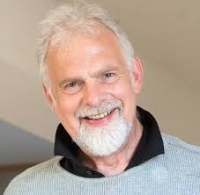
Clark Murray (born 1938) is an American sculptor who is best known for his large outdoor constructions of welded and painted steel pipes.Sculptures by Clark Murray include:White Mountains, a 1977 three-ton welded steel pipe sculpture was on loan for a brief time beginning in 1982 at the Laumeier Sculpture Park (St. Louis, Missouri. Its current location is unknown.A 1973 untitled painted steel pipe sculpture at the University of St. Thomas (Houston, Texas) owned by the Menil CollectionA 1974-5 untitled painted steel sculpture at the Museum of Fine Arts, Houston (Houston, Texas)
Haydn

Franz Joseph Haydn (March 31, 1732 – May 31, 1809) was one of the most prominent composers of the classical period, and is called by some the "Father of the Symphony" and "Father of the String Quartet".
A life-long resident of Austria, Haydn spent most of his career as a court musician for the wealthy Hungarian Esterházy family on their remote estate. Isolated from other composers and trends in music until the later part of his long life, he was, as he put it, "forced to become original".
Although Haydn is still often called "Franz Joseph Haydn", the composer did not use the name "Franz" during his lifetime and this misnomer is avoided by modern scholars and historians. Joseph Haydn was the brother of Michael Haydn, himself a highly regarded composer, and Johann Evangelist Haydn, a tenor.
A central characteristic of Haydn's music is the development of larger structures out of very short, simple musical motifs, often derived from standard accompanying figures. The music is often quite formally concentrated, and the important musical events of a movement can unfold rather quickly.
Haydn's work was central to the development of what came to be called sonata form. His practice, however, differed in some ways from that of Mozart and Beethoven, his younger contemporaries who likewise excelled in this form of composition. Haydn was particularly fond of the so-called "monothematic exposition", in which the music that establishes the dominant key is similar or identical to the opening theme. Haydn also differs from Mozart and Beethoven in his recapitulation sections, where he often rearranges the order of themes compared to the exposition and uses extensive thematic development.
Perhaps more than any other composer's, Haydn's music is known for its humour. The most famous example is the sudden loud chord in the slow movement of his "Surprise" symphony; Haydn's many other musical jokes include numerous false endings (e.g., in the quartets Op. 33 No. 2 and Op. 50 No. 3), and the remarkable rhythmic illusion placed in the trio section of the third movement of Op. 50 No. 1.
A life-long resident of Austria, Haydn spent most of his career as a court musician for the wealthy Hungarian Esterházy family on their remote estate. Isolated from other composers and trends in music until the later part of his long life, he was, as he put it, "forced to become original".
Although Haydn is still often called "Franz Joseph Haydn", the composer did not use the name "Franz" during his lifetime and this misnomer is avoided by modern scholars and historians. Joseph Haydn was the brother of Michael Haydn, himself a highly regarded composer, and Johann Evangelist Haydn, a tenor.
A central characteristic of Haydn's music is the development of larger structures out of very short, simple musical motifs, often derived from standard accompanying figures. The music is often quite formally concentrated, and the important musical events of a movement can unfold rather quickly.
Haydn's work was central to the development of what came to be called sonata form. His practice, however, differed in some ways from that of Mozart and Beethoven, his younger contemporaries who likewise excelled in this form of composition. Haydn was particularly fond of the so-called "monothematic exposition", in which the music that establishes the dominant key is similar or identical to the opening theme. Haydn also differs from Mozart and Beethoven in his recapitulation sections, where he often rearranges the order of themes compared to the exposition and uses extensive thematic development.
Perhaps more than any other composer's, Haydn's music is known for its humour. The most famous example is the sudden loud chord in the slow movement of his "Surprise" symphony; Haydn's many other musical jokes include numerous false endings (e.g., in the quartets Op. 33 No. 2 and Op. 50 No. 3), and the remarkable rhythmic illusion placed in the trio section of the third movement of Op. 50 No. 1.
Lionel Bart
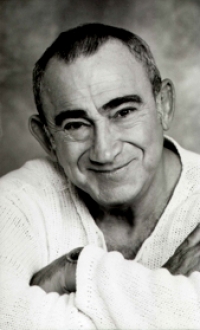
Lionel Bart (1 August 1930 – 3 April 1999) was a writer and composer of British pop music and musicals, best known for creating the book, music and lyrics for Oliver!
He started his songwriting career in amateur theatre, first at The International Youth Centre in 1952 where he and a friend wrote a revue together called IYC Revue 52. The following year the pair auditioned for a production of the Leonard Irwin play The Wages Of Eve at Unity Theatre, London. Shortly after Bart began composing songs for Unity Theatre, contributing material (including the title song) to their 1953 revue Turn It Up, and songs for their 1953 pantomime, an agit prop version of Cinderella. While at Unity he was talent spotted by Joan Littlewood and so joined Theatre Workshop. He also wrote comedy songs for the Sunday lunchtime BBC radio programme The Billy Cotton Band Show.
He first gained widespread recognition through his pop songwriting, penning numerous hits for the stable of young male singers promoted by artist manager and music publisher Larry Parnes. Bart's pop output in this period includes the hits "Living Doll" (written for Cliff Richard) and "Rock with the Cavemen","Handful of Songs", "Butterfingers" and "Little White Bull" (for Tommy Steele). During this period, Mike Pratt as well as Steele were his songwriting partners. In 1957, he won three Ivor Novello Awards, a further four in 1958, and two in 1960. He wrote the theme song for the 1963 James Bond film From Russia with Love. His other hits include: "Do You Mind?" (recorded by both Anthony Newley and Andy Williams), "Big Time" (a 1961 cover of his "Fings Ain't Wot They Used T'Be" show tune by Jack Jones), "Easy Going Me" (Adam Faith) and "Always You And Me" (with Russ Conway).
Bart was also responsible for the discovery of two of Parnes' biggest stars. It was on his recommendation that Parnes went to see singer Tommy Hicks, whom he signed and renamed Tommy Steele, and Bart also suggested that Parnes see singer Reg Smith, who was then performing at the Condor Club. Although Parnes missed his performance, he went round to Smith's house and signed him up on the basis of Bart's recommendation. Smith went on to score a number of UK hits under his new stage name Marty Wilde.
He started his songwriting career in amateur theatre, first at The International Youth Centre in 1952 where he and a friend wrote a revue together called IYC Revue 52. The following year the pair auditioned for a production of the Leonard Irwin play The Wages Of Eve at Unity Theatre, London. Shortly after Bart began composing songs for Unity Theatre, contributing material (including the title song) to their 1953 revue Turn It Up, and songs for their 1953 pantomime, an agit prop version of Cinderella. While at Unity he was talent spotted by Joan Littlewood and so joined Theatre Workshop. He also wrote comedy songs for the Sunday lunchtime BBC radio programme The Billy Cotton Band Show.
He first gained widespread recognition through his pop songwriting, penning numerous hits for the stable of young male singers promoted by artist manager and music publisher Larry Parnes. Bart's pop output in this period includes the hits "Living Doll" (written for Cliff Richard) and "Rock with the Cavemen","Handful of Songs", "Butterfingers" and "Little White Bull" (for Tommy Steele). During this period, Mike Pratt as well as Steele were his songwriting partners. In 1957, he won three Ivor Novello Awards, a further four in 1958, and two in 1960. He wrote the theme song for the 1963 James Bond film From Russia with Love. His other hits include: "Do You Mind?" (recorded by both Anthony Newley and Andy Williams), "Big Time" (a 1961 cover of his "Fings Ain't Wot They Used T'Be" show tune by Jack Jones), "Easy Going Me" (Adam Faith) and "Always You And Me" (with Russ Conway).
Bart was also responsible for the discovery of two of Parnes' biggest stars. It was on his recommendation that Parnes went to see singer Tommy Hicks, whom he signed and renamed Tommy Steele, and Bart also suggested that Parnes see singer Reg Smith, who was then performing at the Condor Club. Although Parnes missed his performance, he went round to Smith's house and signed him up on the basis of Bart's recommendation. Smith went on to score a number of UK hits under his new stage name Marty Wilde.
 Sheet Music Network is a site for those who wants to access popular sheet music easily,
letting them download the sheet music for free for trial purposes.
It's completely free to download and try the listed sheet music, but you have to delete the files after 24 hours of trial.
Don't forget, if you like the piece of music you have just learned playing,
treat the artist with respect, and go buy the original sheet music.
Sheet Music Network is a site for those who wants to access popular sheet music easily,
letting them download the sheet music for free for trial purposes.
It's completely free to download and try the listed sheet music, but you have to delete the files after 24 hours of trial.
Don't forget, if you like the piece of music you have just learned playing,
treat the artist with respect, and go buy the original sheet music.

